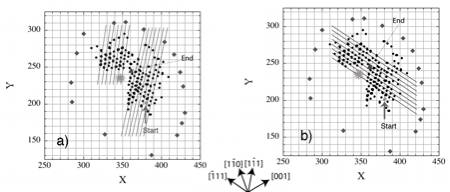

44958-AC5
Step-Edge Barriers on Channeled Surfaces
As part of our
effort to examine bounded surfaces, detailed analyses have been carried out of
adatom diffusion we have observed with the field ion microscope on a dislocated
W(110) surface. These analyses have revealed unusual and quite unexpected
behavior. On a defect-free surface, the preferred path for diffusion is along
the <111> directions, with both equally probable. It turned out that this
is not true on the dislocated surface. The mean-square displacement along [ 




We
have also analyzed the behavior of asymmetric random walks on a surface and
derived the moments of the displacement. In a process illustrated in Fig. 2,
jumps to nearest-neighbor positions at the right occur at the rate





but higher moments have been obtained as well. Also derived has been the distribution of displacements,

a thorough analysis of diffusion processes is now possible.
G. Antczak and P. Joźwik, Langmuir 24, 9970 (2008)
G. Antczak and G. Ehrlich, J. Chem. Phys. In Press (2008)

Fig. 1. Map of surface
sites occupied by adatom in diffusion at 340 K. a) Grids associated with the [



Fig. 2. Schematic of a one-dimensional random walk, showing jump rates to nearest as well as next-nearest neighbors.